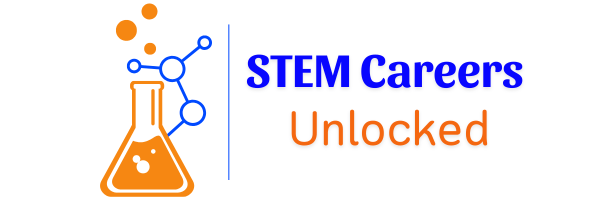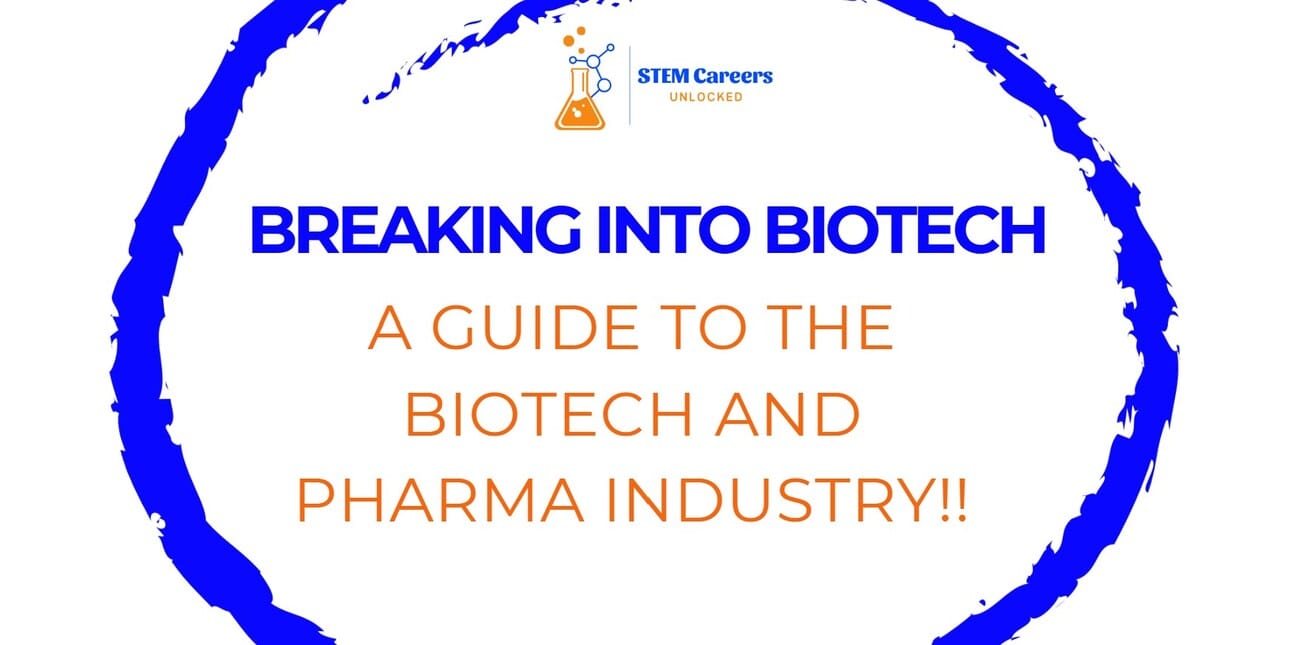
Good morning, STEM enthusiasts! Happy first day of summer! Whether you're wrapping up finals, starting a job, or just vibing, this is your time to chill and glow up.
We’ll be dropping quick tips, cool opportunities, and ways to level up without missing out on the fun.
So grab your shades, and let’s make this summer count. 😎
Today’s issue:
🔎Career Spotlight: Decoding Data. Advancing Science: Data Scientist in Action!
💡Skills Spotlight: Lead with Quiet Confidence (No Shouting Required)
🔥Career Glow-Up Challenge: Digital Declutter Challenge (4 Days)
📉Job Trends: Early-Career Professionals Face Steep Climb in Tight Market
💼Resource: Breaking into Biotech: A Guide to the Biotech & Pharma Industry

🔎STEM CAREER JOB OF THE WEEK
⚛️Decoding Data. Advancing Science: Data Scientist in Action!

A data scientist or engineer in biotech or pharma helps make sense of the huge amounts of data generated from research, clinical trials, genomics, drug discovery, and patient outcomes. Their work supports everything from identifying promising drug candidates to predicting how patients will respond to therapies.
These data scientists build models, analyze patterns, and generate insights that enable scientists, researchers, and business leaders to make better decisions more quickly.
🎓Major:
- Data Science, Computer Science, Bioinformatics, Statistics, Applied Mathematics, Biology, Chemistry, Biomedical Engineering (data focus), or other related science degrees.
Job functions:
⚛️As an entry-level Data Scientist/Engineer, you help companies turn complex data into smart decisions—whether it’s predicting drug outcomes, improving research efficiency, or spotting trends in clinical trials. Some key responsibilities include:
🔎Clean, organize, and analyze large datasets from clinical, genomic, or R&D sources
🔎Develop machine learning models to support drug discovery, patient stratification, or risk prediction
🔎Visualize complex results using tools like Tableau, Python, or R
🔎Help automate data pipelines and improve data workflows
🔎Support experimental design and statistical analysis for lab or clinical studies
🔎Present insights and recommendations to technical and non-technical audiences
🧠Skills Needed:
Technical:
-Programming: Python, R, SQL
- Machine learning basics (scikit-learn, XGBoost, etc.)
- Data visualization: Tableau, Power BI, Power Automate, Appian, Clout Sync, Qlik
- Understanding of statistics, probability, and experimental design
Soft Skills:
- Problem-solving and critical thinking
- Communication—especially translating technical results into clear insights
- Curiosity and willingness to learn complex science topics
- Collaboration with researchers, engineers, and product teams
- Time management and attention to detail
💰Salary Landscape:
- The salary range varies depending on factors such as location, experience, and skill level.
- You can expect an annual salary ranging from $29,093 to $128,763, with an average of $70,711 per year in the United States. Source: Zip Recruiter)

Don’t snooze on student loans
June is the sweet spot to start planning how you’ll cover what FAFSA doesn’t.
You’ve got time to compare options, talk it over with a co-signer, and find a private loan that actually fits your life.
Think beyond tuition—the right student loan can cover housing, meal plans, and even your laptop.
View Money’s best student loans list to find a lender, apply in as little as 3 minutes, and start the semester on the right foot.

💡SKILLS SPOTLIGHT
🗣️Lead with Quiet Confidence (No Shouting Required)

✨🗣️Let’s clear something up: not every leader needs to be the loudest voice in the room.
In fact, some of the most respected, effective leaders I’ve coached in STEM aren’t the ones who dominate conversations—they’re the ones who lead with quiet confidence.
🗣️They listen deeply.
🗣️They speak with intention.
🗣️They create calm in high-stakes environments.
This week, let’s talk about how to develop a leadership presence that doesn’t rely on volume or bravado—especially if you’re someone who values reflection, clarity, and thoughtful communication.
Here are a few quiet leadership behaviors that make a powerful impact:
✔️Use strategic pauses to reclaim the room and direct attention
✔️Summarize what’s been said to clarify thinking and guide next steps
✔️Ask a well-placed question instead of always offering an answer
✔️Model emotional steadiness in tense or uncertain situations
You don’t need to change your personality to be seen as a leader—you just need to use it on purpose
Try this:
In your next meeting, practice one quiet leadership move:
→ Pause before responding.
→ Reframe the conversation.
→ Anchor the group in the big picture.
You don’t have to shout to be heard.
You just have to lead with intention.
Which quiet leadership move will you try this week? Hit reply and let me know—or tag me if you post about it on LinkedIn!

🗑️🔥CAREER GLOW-UP CHALLENGE:
Digital Declutter Challenge (4 Days)

🔥🗑️ Goal: Tidy up your online presence and workspaces so you can think clearer, work smarter, and show up with confidence in any career moment.
Why It Matters:
Let’s be honest—between classes, job apps, and late-night group projects, your digital space can get messy. All those random screenshots, unread emails, and chaotic folders? They make it harder to focus and could totally hide your best work when it matters most.
This 4-day Digital Declutter Challenge will help you clean up your digital space, get organized, and ensure your digital self looks just as sharp as your real one. Especially when recruiters, classmates, or future mentors look you up online—because yes, they do check.
Day 1: Desktop & Downloads Detox
Focus: Clean the clutter where you work every day.
🗑️Delete those random icons covering your desktop
🗑️Make folders for stuff like “Resumes,” “Class Projects,” “Job Apps,” etc.
🗑️Clear out your Downloads folder (goodbye 12 versions of that PDF)
✨✨Bonus: Pick a new wallpaper that gets you hyped—career goals, vision board, or just something chill
Day 2: Inbox & Email Glow-up
Focus: Make your inbox less of a black hole.
📫Archive or delete old stuff clogging up your inbox (looking at you, job alerts from 3 months ago)
📫Unsubscribe from newsletters you don’t even open
📫Create folders like “Job Apps,” “Networking,” or “Follow Up” so things don’t get lost
📫Update your email signature—add your LinkedIn, website, or digital portfolio
Day 3: Cloud & Career Docs Refresh
Focus: Get all your important files in one easy-to-find spot.
🔎Rename your files clearly—no more “final_FINAL_resume_v3.docx” (e.g., “Jordan_Resume_Biotech.pdf”)
☁️Create a “Career Toolkit” folder in Google Drive or Dropbox with:
- Updated resume(s)
- Cover letter templates
- Reference list
- Certificates or transcripts
- Work samples or portfolio pieces
✅ Make sure you can access it all from your phone
Day 4: LinkedIn Clean-Up & Digital Footprint Check
Focus: Show the internet your best professional self.
🖊️Refresh your headline and About section—make it sound like the you of today
🖊️Delete old bios or posts that don’t reflect your current goals
🖊️Add any new jobs, awards, or cool stuff you’ve done lately
🖊️Update your profile pic and banner (clean, friendly, professional-ish)
🖊️Google yourself—see what shows up and clean up anything questionable
✨Wrap-Up Task: Pin a project, post, or article that shows off your skill (project, article, or pitch deck).
🎉🎯Bonus Tip: Your digital space should work for you—not stress you out. Give yourself 15 minutes a day this week to declutter, organize, and level up. Use this workbook to keep you on track.

📈📉JOB TRENDS:
Early-Career Professionals Face Steep Climb in Tight Market

iStock, Agdekon Media Visuals
Some companies’ preferences for individuals with existing industry experience, combined with the tough job market, are among the hurdles that those just starting out in biopharma must navigate, two recruitment experts told BioSpace.
Early-career biopharma professionals seeking employment are facing multiple employment challenges due to employer preferences, a tough job market, and an ever-changing industry, according to two recruitment experts.
One key factor affecting these professionals is that some companies prefer job candidates who already have industry experience over those who have just received their Ph.D., according to Carina Clingman, founder and CEO of Recruitomics Consulting, which specializes in talent acquisition and talent strategy for startup biotechs.
“It’s incredibly hard for our new grads and folks trying to move from a postdoc into their first industry position,” she told BioSpace. “It’s incredibly competitive.” (source: Biospace.com)

💼PROFESSIONAL DEVELOPMENT
Breaking into Biotech: A Guide to the Biotech & Pharma Industry!
💼Hey there—thinking about a career in biotech?
You’re in the right place. Whether you're deep into your STEM major or just starting to explore career options, this Breaking into Biotech Career Guide is here to help you figure out what the biotech world is all about—and how you can be a part of it.
Biotech is where science, innovation, and real-world impact come together. From cutting-edge research to creating life-saving therapies, there's a place for almost every interest and skill set. We’ll break down what the industry looks like, what kinds of jobs are out there, and what steps you can take now to get your foot in the door.
Let’s get into it!

What kind of professional development content would you like to see?






